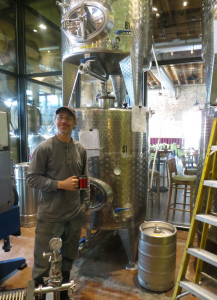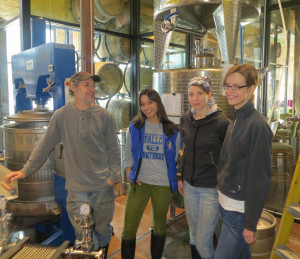Majority of City Winery’s First Vintage Goes In Kegs
On March 23, City Winery Chicago bottled its first vintage. Of the 300 gallons of Oregon Pinot Noir and 300 gallons of California Sauvignon Blanc that were made, 70% will go into kegs for consumption at City Winery, according to winemaker Rober Kowal.
Kegged wine has many benefits, according to Kowal. To start with, kegs reduce “bottle shock” and disjointed flavors. Since the wine will be consumed at the adjacent City Winery restaurant during the next several months, there is less need for anti microbial measures, Kowal said. Kegged wine requires less SO2 than bottled wine and cold stabilization is usually not required.
Of course there’s no wine bottle to be corked, so there is no risk of TCA contamination and so-called “corked” wine.
With kegs, the environmental footprint is reduced, Kowal pointed out. Transportation for glass, corks, labels, foil, etc. is completely eliminated.
See related story: Domaine Berrien Rolls Out Kegs at Chicago’s Farmhouse
City Winery uses 15.5 gallon aluminum beer kegs for wine and the kegs can be cleaned and reused (for wine only) almost indefinitely. Kowal prefers argon gas to pressure the kegs. According to California wine production expert Clark Smith, Argon is the best inert gas for use with wine because it does not dissolve in liquids like carbon dioxide.
Nitrogen is also sometimes used to pressure wine kegs, but nitrogen tends to dissipate more quickly than Argon because it’s lighter than air, according to Smith.
The drawback of kegged wine is the inability to age the wine. According to Kowal, nothing beats a natural cork for the proper amount of respiration to slowly expose a wine to air as it matures.
Kowal is currently seeking Great Lakes grapes for his 2013 vintage. Last fall, City Winery received a shipment of 63 tons of grapes, all of which were packed in 35 pound plastic lugs.
Kowal came to wine as a second career while working as a writer-producer for the PBS cooking series, “Hawaii Cooks.” In Oregon, he established his own label, Frameworks Wine, specializing in small lots of Pinot Noir.



